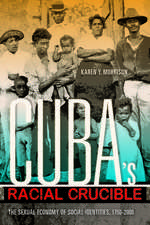Haitian Revolutionary Studies
Autor David Patrick Geggusen Limba Engleză Hardback – 11 aug 2002
Librarul mai recomandă
Preț: 211.05 lei
Nou
Puncte Express: 317
Preț estimativ în valută:
40.39€ • 43.18$ • 33.67£
40.39€ • 43.18$ • 33.67£
Carte tipărită la comandă
Livrare economică 17 aprilie-01 mai
Preluare comenzi: 021 569.72.76
Specificații
ISBN-13: 9780253341044
ISBN-10: 0253341043
Pagini: 352
Ilustrații: 4 b&w photographs
Dimensiuni: 164 x 241 x 25 mm
Greutate: 0.64 kg
Editura: MH – Indiana University Press
ISBN-10: 0253341043
Pagini: 352
Ilustrații: 4 b&w photographs
Dimensiuni: 164 x 241 x 25 mm
Greutate: 0.64 kg
Editura: MH – Indiana University Press
Cuprins
Preliminary Table of Contents: PrefaceAcknowledgementsPart 1. Overview1. The Haitian RevolutionPart 2. Historiography and Sources2. New Approaches and Old3. Underexploited SourcesPart 3. The Seeds of Revolt4. The Causation of Slave Rebellions: An Overview5. Marronage, Vodou, and the Slave Revolt of 17916. The Bois Caman CeremonyPart 4. Slaves and Free Coloreds7. The "Swiss" and the Problem of Slave/Free Colored Cooperation8. The "Volte-Face" of Toussaint Louverture9. Slave, Soldier, Rebel: The Strange Career of Jean KinaPart 5. The Wider Revolution10. Racial Equality, Slavery, and Colonial Secession during the Constituent Assembly11. The Great Powers and the Haitian Revolution12. The Slave Leaders in Exile: Spain's Resettlement of Its Black Auxiliary TroopsPart 6. Epilogue13. The Naming of Haiti; Chronology; Notes; Works Cited; Index
Recenzii
Only two of the 13 essays in Geggus's specialized examination of large and minor themes in Haiti's revolutionary history are new: his exploration of the so-called Swiss rebel slaves who were armed by free coloreds, and his discussion of the resettlement around the Caribbean of those slaves who allied with Spain against France. The others, which appeared in scholarly and regional journals as long ago as 1980, as well as in a guidebook, have been revised and updated. Together they comprise an important corpus of research on aspects of the Haitian Revolution (1791-1803) and the complementary events that the cataclysm in the French colony precipitated. As Geggus (Univ. of Florida) explicitly and implicitly shows, cataclysm is not too strong a word to describe the slave uprisings and subsequent colonial and anticolonial maneuverings that resulted in the emancipation of 500,000 slaves in one of the most productive and profitable colonies in the world. Geggus asserts that the Haitian Revolution involved the greatest degree of mass mobilization and brought the greatest degree of social and economic change of all of the independence struggles in the Americas. His chapters develop and deepen aspects of that generalization. Summing Up: Recommended. Graduate students and faculty.--R. I. Rotberg, Harvard University"Choice" (01/01/2003)
Descriere
A complete and comprehensive history of the Haitian Revolution


















